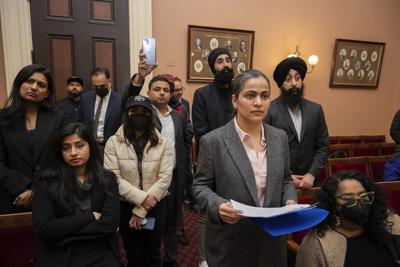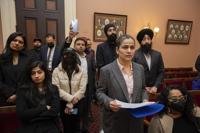The California Senate voted 34-1 Thursday in favor of legislation outlawing caste discrimination in the state. If it passes in the state Assembly and is enacted, California could become the first state in the nation to make caste bias illegal by adding it as a protected category in the state's anti-discrimination laws.
State Sen. Aisha Wahab, D-Hayward, the first Muslim and Afghan American elected to the legislature, in March. Caste is a division of people related to birth or descent and those at the lowest strata of the caste system known as Dalits, have been pushing for legal protections in California and beyond. They say it is necessary to protect them from bias in housing, education and in the tech sector — where they hold key roles.
Thursday's vote was swift, with only Sen. Brian Jones voting against the legislation, which has been controversial. On April 25, hundreds on both sides of the issue came to voice their opinions during on the matter. Proponents say caste discrimination is a reality in California and that clarifying the state's anti-discrimination laws will help protected caste-oppressed communities. Opponents have maintained that the law will single out Hindus and people of Indian descent.
Jones, R-Santee, said he has heard concerns from numerous constituents and agrees with them that the legislation unfairly targets a specific group. He contends that caste bias is already covered under existing anti-discrimination laws.
In April, the California Civil Rights Department voluntarily dismissed its case alleging caste discrimination against two Cisco engineers, Sundar Iyer and Ramana Kompella, while still keeping alive its litigation against the Silicon Valley tech giant.
In February, and the first jurisdiction outside South Asia to add caste to its anti-discrimination laws. Several colleges and universities have also enacted similar policies barring caste discrimination on campuses, including University of California, Davis.
___
Associated Press religion coverage receives support through the AP’s with The Conversation US, with funding from Lilly Endowment Inc. The AP is solely responsible for this content.








































